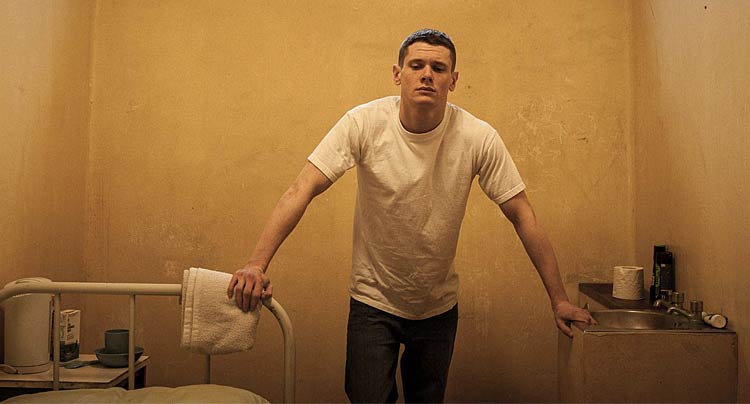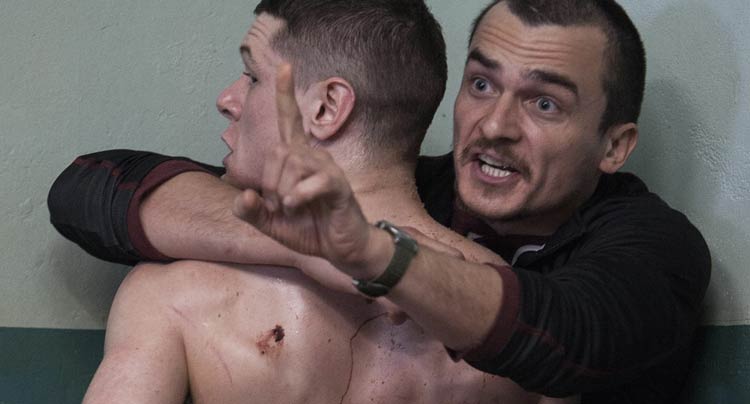
A thrilling prison drama holds some superb performances.

A thrilling prison drama holds some superb performances.
Fans of the terrific cult British teen drama Skins have long suspected that it was only a matter of time before Jack O’Connell rose to star status. Fantastic as many of the young actors of that series were, O’Connell always stood a cut above the rest, elevating even the most contrived material through sheer conviction and passion. The show made it clear that if O’Connell was only given a more mature, nuanced story, he would be an actor to look out for. Thankfully, provided a platform to fully demonstrate the considerable range of his talents, O’Connell ably rises to the occasion in the brutal, riveting prison drama Starred Up.
O’Connell stars as nineteen-year-old Eric Love. We first see Eric being transferred from a youth prison to an adult prison for being “starred up” – or being too high-risk to still be treated as a juvenile offender and thus given an early transfer. He has already been hardened by the time of his arrival. A troubled life has prepared him, to an extent, for his stint in this new prison. He carries himself with the attitude of someone who has already seen it all. But he is also still young, and he only acts like he is smarter and more in control than he actually is.
Yet the system doesn’t faze him – even as it starts to throw right hooks that probably ought to cause him to bide his time and “play by the rules,” as one person describes it. His initial arrival tells us volumes about who Eric is and what he has been through. After going through processing with a bleary look of boredom, his first act upon arrival is to masterfully, efficiently craft a razor-blade shiv. Eric is a veteran of this world, not a newborn babe up for the slaughter.
Director David Mackenzie shoots the film with a keen sense for purely visual storytelling. The majority of pertinent information is provided largely through images, and Mackenzie patiently allows us to slowly grasp the complex order of this world. He trusts that even when we don’t understand specifically what is taking place that we will get the general gist and pick up what we didn’t quite catch later (Mackenzie packs the margins of the narrative with an exceptional amount of detail that he never feels the need to call too much attention towards). This is valuable because the dialogue is thick with heavy, sometimes indecipherable, working-class British accents. Mackenzie aims for immersion, and he shoots the film in a docu-realistic style. Cinematographer Michael McDonough, best known for his work on the similarly understated yet vibrant Winter’s Bone, matches the handheld shots with cinematography that subtly drains the color to emphasize the bleaknesss and realism.

Eric is volatile, looking everywhere for an excuse to lash out. His emotional instability is exacerbated by the presence of his father Neville (Ben Mendelsohn), a prison lifer and the second-in-command of the prison’s drug trade. Neville was absent from Eric’s life growing up, and he has no clue how to act as a father to his child, even as he draws himself closer – initially to stop Eric from disrupting the drug trade and later out of a real but misplaced concern. An alternative father figure for Eric arrives when counselor Oliver Baumer (Rupert Friend) saves him from a harsher sentencing for severely beating up a fellow inmate on his first day. Oliver has Eric join his therapy group, filled with younger inmates, to try to work through his issues. The film’s central struggle centers on the pull-and-tug between Neville and Oliver over Eric. Despite how stereotypical and familiar that conflict and these characters sound on paper, the performances, the writing and the direction invest every moment with a sense of ruthless psychological realism. Oliver may be idealistic but his resolve is brittle and his optimism has its limits.
Starred Up’s script is based on writer Jonathan Asser’s actual experiences volunteering as a counselor for the HM Prison Wandsworth, and Oliver is plainly a stand-in for Asser and his perspective on the prison system. Starred Up may not be a social problem film, but in its piercing, untarnished depiction of the prison system, it becomes a powerful indictment of the institution’s many failings. Asser isn’t just interested in the prisoners and their day-to-day struggles – although that is his primary focus. Rather, he wants to build up the entire ecosystem of this world, including the guards and administrative staff, and how the system fails every person that is part of it. Starred Up makes the compelling argument that incarceration is simply easier than rehabilitation, even if in the long-run the latter would probably be more successful – but it would also be prohibitively time-consuming and less profitable.
Like the television series Orange is the New Black, the film wishes to find the humanity hidden within the institutional structure and spread empathy to the under-examined figures who are stuck there. But that’s where the parallels between these two works end. For one thing, Starred Up is set at a maximum security prison with some of England’s worst criminal offenders. For another, it’s unsparingly unsentimental in its look at the prison system. Perhaps most crucially, it concerns itself with masculinity and the corrosive way it is practiced in the prison system. Traditional masculinity defines the behavior and interactions of every inmate. During therapy, individuals make slights about other members’ mothers and the integrity of their heterosexuality (tellingly, Neville secretly has a relationship with his cellmate that he is desperate to keep under wraps). It constantly threatens to boil over into fighting, or worse. Everyone is posturing: they have appearances and reputations to maintain — ones that matter for the largely career criminal make-up of the prison who have no other options or hopes for control or power beyond these prison walls.

However, for all its cutting social commentary, Starred Up is not only a well-observed psychodrama. It is also an intense thriller. Eric’s arrival shakes up the social order of the prison. This is coupled with his unpredictable behavior. His actions ripple out to effect the whole prison hierarchy. When he runs afoul of the prison’s lucrative drug trade, he puts his life greatly at risk, both from above and within. But Eric welcomes it, needling people to see how far he can push them and jumping to violence as a first response to conflict. Mackenzie ratchets up the tension until it becomes unbearable and destruction feels all but inevitable.
If the way Starred Up is never showy, that owes partly to having a number of big performances that more than make up for the visual sparseness. There are three tremendous performances, from Mendelsohn, Friend, and especially O’Connell. O’Connell is remarkable, matching his co-stars beat-for-beat and occasionally even out-classing them. He has the charisma of a leading man, but he also has the committed rigor of a method actor. It’s at once a huge, explosive performance and also a deeply interior one. O’Connell commands the space around him in ways that actors twice his age have no clue how to do. Notice the way he carries himself. There is a full-bodied physicality to his acting – even just furrowing his brow or shifting his eyes, O’Connell is able to convey a surprising amount of information. Eric exudes restless energy. He knows no other way of life and he has resigned himself to his fate. But there is more than just weariness and barely suppressed rage here. There are hints of genuine fear. He is just a kid somewhere underneath it all. O’Connell shows this layer while also making Eric more formidable than just about every person surrounding him. It’s a fearless, mesmerizing performance. If this doesn’t make O’Connell a star, I’m not sure what will.